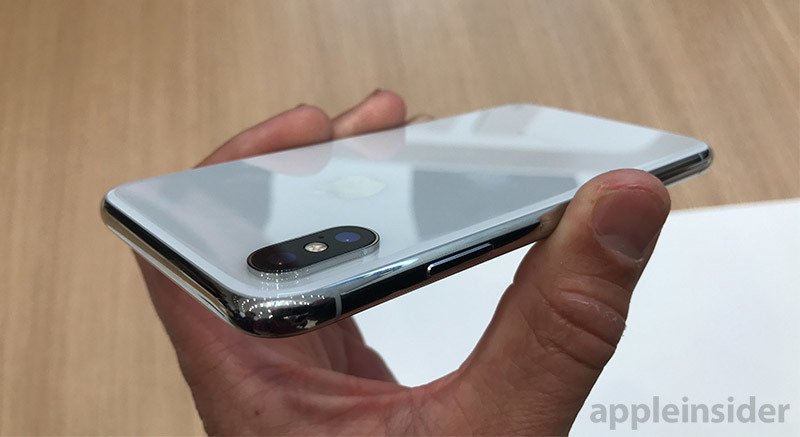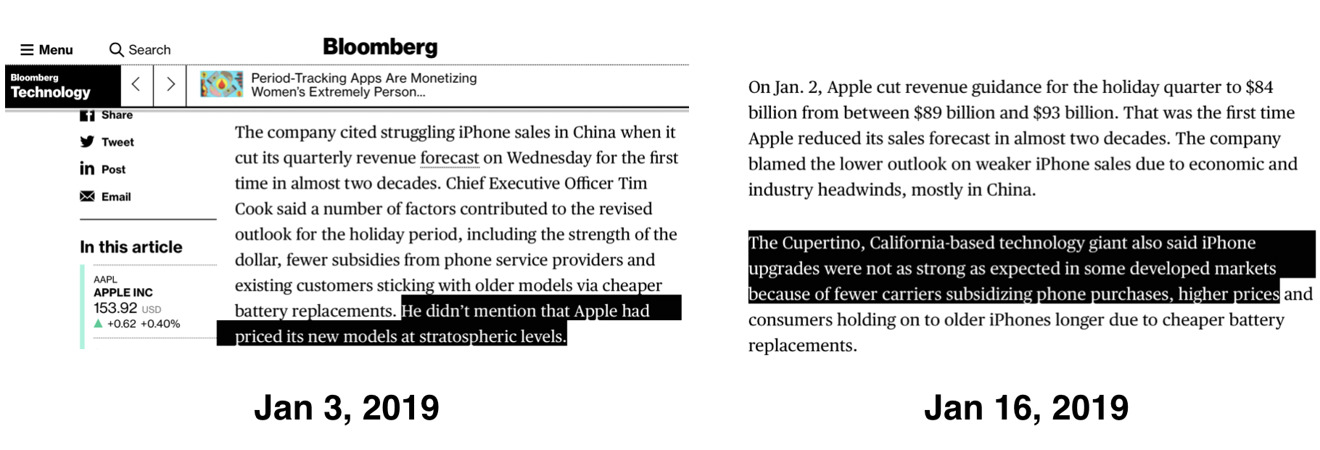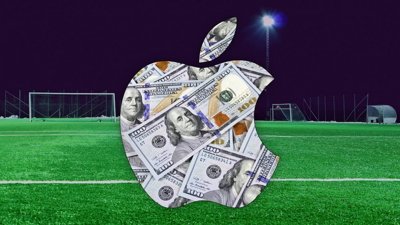Apple in 2019 and the case of the expensive iPhone
A glance at the writing that passes for financial news headlines today might make it appear that Apple is entering 2019 with troubled sales, intense new competition emerging in China, and a weakening economy where nobody can afford to buy its expensive products anymore. The solution held up by many pundits is so old that it sounds comfortably soothing: iPhones should be cheaper! But they're wrong, here's why.
The feedback loop
Many analysts and various pundits seem to be concerned that Apple has increased the price of iPhones, and they're again recommending the only solution they know — Apple has to slash pricing to induced demand for its products! This advice comes from the now standard practice of reading what people are saying in social media and then crafting a word salad that repeats these same common but fact-light ideas so as to elicit populist agreement.
As Apple columnist Rene Ritchie recently noted on Twitter, tech industry writers short on ideas have admitted that they are now perusing discussion sites like Reddit to suck up previously stated opinions and regurgitate these in thought-pieces solely to ramp up their social media engagement statistics, regardless of whether those ideas are good or even something the writer agrees with. The point of "generating content" is inducing clicks, likes, and shares, not to inform and certainly not an attempt to be accurate or valuable.
This isn't unique to politics. Tech media folks have told me in the past that they read Reddit, create something to affirm whatever popular theories they read, and then sit back and rake in huge views. It's playing to a base. Often without agreeing with/caring about the PoV. https://t.co/8hCBI9nDu5
— Rene Ritchie (@reneritchie) January 5, 2019
The specific problem with the "iPhones are too expensive" story, however, is Apple didn't really raise the price of iPhones. It expanded iPhone pricing in both directions, creating the least expensive models and the most expensive models it has ever offered. It has been Apple's customers that have pushed the Average Selling Prices of iPhones up by choosing to buy more expensive models.
Lowering the price of iPhones sounds great in theory, but the result of Apple cheapening its products would not be different from the results of other companies that have worked to make their smartphones cheaper rather than better. If Apple began doing what Samsung, Huawei, Xiaomi and others were doing, it too would be performing poorly as a company, failing to introduce real innovations and forced to simply mimic the work of others.
Offering iPhones laden with features and giving its installed base solid reasons to buy them is the secret of Apple's success, not the cause of its problems. But it's just too popular to suggest that the solution to all of Apple's problems is to lower prices, because who doesn't like to save money?
Lying about Apple
Tech media writers are not just rhetorically imploring Apple to slash prices solely to butter up popularity among their audiences. They are also pushing a false narrative that Apple's iPhone pricing is both slowing sales and shifting consumer demand to cheaper Android alternatives, two ideas that are not supported by facts. But inventing a plausibility is not the same thing as discovering and proving a causality.
Major media sources including Bloomberg and the Wall Street Journal previously spent much of last year promoting the idea that iPhone X was too expensive, an idea that was empirically proven to be false by real-world data. And yet today they are again boldly repeating the same false information about the latest batch of iPhones.
This time, they are taking care to contradict their own narratives with meek observations of reality, so that their attention-getting sensationalist headlines are hedged by later paragraphs of sheepish acknowledgments that effectively admit that the entire premise of their articles is just tabloid-esque filler. We know why: these articles aren't trying to establish a pattern of accurate, reliable reporting; they're merely fluff content blown out to induce outrage in order to drive the social media engagement that supports their surveillance advertising clickbait revenue model.
The same Bloomberg writer who repeatedly insisted a year ago that iPhone X was not selling well because "some" couldn't afford it is again repeating the idea that "higher prices" are a key reason for iPhone sales problems today. As a reminder, consumers were flocking en masse to the new model despite its price premium, topping Apple's sales charts with it every quarter, and radically improving the company's average selling price of phones at the same time that this was written.
In parallel, the same writer produced disproportionate, informercial-like coverage of Google's Pixel products, without similar scrutiny of their pricing. Yet Google's premium-priced Pixel phones directly competed unsuccessfully with cheap Androids, while Apple's premium-priced iPhone X outsold all of Apple's lower-priced iPhones. Clearly, pricing wasn't an insurmountable problem for iPhone X as Bloomberg claimed, yet it has been a major obstacle for Pixel.
A January 16th Bloomberg report even attributed the idea that "higher prices" were hurting iPhone upgrades to Apple itself. In reality, Tim Cook's letter to investors never once stated that the iPhone price tiers were a factor in lower than expected sales. Instead, Cook noted only that unfavorable exchange rates were, citing "US dollar strength-related price increases," not the company's pricing strategy on its newest models.
Incredibly, the same Bloomberg writer, just two weeks prior, had written that "Cook said a number of factors contributed to the revised outlook for the holiday period," and specifically stated that Cook "didn't mention that Apple had priced its new models at stratospheric levels."
Within two weeks, the same writer had shifted the Bloomberg narrative of high priced iPhones from something Cook had supposedly refused to acknowledge, to an idea he claimed Cook himself had made in explaining why iPhone sales were lower than expected.
One can criticize Apple's statements, but falsely twisting them to support a made-up narrative is simply dishonest. It's the opposite of journalism. The primary problem Apple faces in 2019 isn't China, a battery replacement program, nor any one of the given dramas of the day that seem to surround the company without any real truth behind them. Instead, it's a lack of context, accuracy, and care in reporting.
Fortunately, these writers and analysts are not very good at anything apart from manipulating Apple's stock price. They've done nothing to shift what consumers want or to change public opinion of Apple despite many years of desperately trying to do so.
Two sets of reality: one for Apple, one for Samsung
Apple's December quarter guidance originally anticipated an additional $5 to $9 billion in revenues. That shortfall called out in the company's guidance adjustment appears to have been mostly from missed hardware sales, primarily additional iPhones Apple expected to sell in China. If it occurred solely from missed sales of iPhones, that would amount to about 6 to 11 million phones at its current ASP. That's about a ten-day supply of Apple's global iPhone sales.
Apple's original guidance indicates that that company was intending to pull in more revenue this quarter than ever. Instead, for the December quarter Apple now expects its revenues to be just under 5 percent less than its previous record last year.
If you step back to look at the full second half of Apple's 2018 sales— including the entire launch window of its new iPhones, including its most expensive iPhone XS models— Apple's total sales grew by 4.25 percent. Based on its latest guidance, Apple brought in revenues of $146.9 billion between July and December, compared to $140.9 billion in the same period last year, during the incredibly successful launch of iPhone X.
So while pundits are crowing about "the high price of iPhones," the reality is that premium models are driving Apple's revenues and sales, stoking the very demand that keeps the company profitable and capable of investing in the future.
In contrast, note that Samsung's premium Galaxy sales have been plummeting by more than 10 million units virtually every year, yet nobody calls that a "collapse" in sales, even when it's coming out of the much smaller number of premium, profitable smartphones that Samsung sells. Across the two quarters that Samsung launched its Galaxy S9 last year, analysts estimate it only sold about 31 million, compared to the peak of 50 million units of the Galaxy S7 models that sold in 2016.
Compared to the more than 215 million premium iPhone models Apple sells annually, a drop in expected sales of around 10 million is hardly comparable to the implosion of Samsung's flagship sales. Yet for Apple it's described as the end of the road for iPhones, a collapse in demand, and a perilous shift that requires an emergency pivot into becoming a Netflix.
But for Samsung? The much greater drop that company is seeing in premium shipments and profitability was greeted by articles like this one: "Galaxy S9 sales may be low, but don't worry, Samsung isn't doomed".
Across fiscal 2018, Apple actually sold about a million additional units, year over year of its premium-priced iPhones. At the same time, Apple brought over $24 billion in new revenue despite already representing the luxurious cream layer of an industry that as a whole had contracted by 2.9 to 3.3 percent across 2018.
So while analysts and members of the media keep beating the same "iPhones need to be cheaper" drum they've been banging on since 2007, the reality is that Apple's premium pricing has attracted the most demanding and cost-insensitive buyers to iOS. It might sound populist and affirming to chant slogans like "the fanciest iPhones are too expensive," but that's clearly not actually a problem for Apple.
In reality, Apple's ability to raise prices is a primary reason why the company has been wildly successful across multiple industries that are systemically suffering in commercial failure elsewhere, from tablets to PCs to wearables.
And, it looks like the price of the top model of the Galaxy S10 is going to be around $1750. There doesn't seem to be a lot of complaints about that.
The threat in China isn't competition, it's recession
Even as pundits keep recommending the "low prices" toxin that's killing Apple's competitors as the medicine for any problems they can invent for Apple, they're also creating another fiction: that companies in China are creating wonderfully attractive, low priced devices that are causing Apple's buyers to leave the expensive world of iOS and take refuge in the more affordable world of Android.
There are several problems with this story. One is that while Apple's iPhone sales are down in China, sales of phones overall are down even more dramatically. Further, Apple's other sales are not similarly affected. iPhone isn't the only premium priced product Apple makes. Yet sales of Macs, iPads and other hardware are not seeing the same dips in sales. All evidence points to delays in purchasing iPhone upgrades, not in a significant competitive shift to alternatives.
The good news for Apple is that delays in iPhone purchases mean sales will eventually come; they're not lost to competitors. Instead, we're more likely to see continued incremental switching to iOS from the populations of lower-end Android shipments occurring in China, India, and other emerging markets following the same pattern of upgrades that have occurred in every market so far.
Another totally false idea that has been recently invented by media fabulists is that once users are taught to use a specific platform, they basically never leave. But that's complete fiction.
Almost every iPhone user has previously owned another make of phone at some point. People have been upgrading to iPhone ever since it came out, and based on a series of industry studies the attrition rate of those leaving iOS is much smaller than the number arriving from other platforms.
Android has long served as the training wheels for eventual iPhone buyers. And at an ASP of around $250, it's easy to understand why people would trade up from their Android rather than move from a premium experience to a cheap one.
The real problem for Apple in China is the threat of a sustained economic slowdown. That appears to be a very real problem for the entire smartphone industry, but a sustained and potentially even dramatic slowdown in China will hurt Apple's competitors worse than Apple itself. That's because Apple's rivals in China are far more exposed to domestic economic problems and are already barely making any money there.
Additionally, Chinese firms have had very little ability to penetrate other major smartphone markets outside, including in the U.S. and other western markets where Apple enjoys a solid base of users, where Android sales are being fiercely defended by Samsung, and where two of the top five Chinese brands now face legal barriers from selling in major markets at all.
How will Cook's Apple weather an economic downturn in China with potentially global effects? We'll be talking about that on Friday.
 Daniel Eran Dilger
Daniel Eran Dilger














 Mike Wuerthele
Mike Wuerthele
 William Gallagher
William Gallagher

 Andrew Orr
Andrew Orr

 Marko Zivkovic
Marko Zivkovic
 Malcolm Owen
Malcolm Owen
 Christine McKee
Christine McKee






